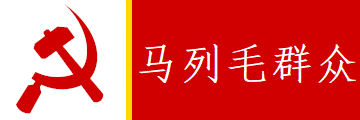社会主义革命成功过吗?
稍微有点历史常识的人都知道苏联和中国都经历过社会主义时期,在那个时期是确实存在的社会主义阶段,剥削都被基本消灭了。
那是历史,现在呢?
印度共产党(毛主义),土耳其共产党(马列),秘鲁共产党确实在领导着持久人民战争。
也就是说确实有人在此时此刻正在践行者这些理论。
什么叫做“实际的工作”呢?
革命的客观条件难以预测,主观条件应尽早确立。
毛主席讲过有两大飞跃。可以通过实践把精神世界变成物质世界。
而无产阶级认识世界的目的,只是为了改造世界,此外再无别的目的。一个正确的认识,往往需要经过由物质到精神,由精神到物质,即由实践到认识,由认识到实践这样多次的反复,才能够完成。这就是马克思主义的认识论,就是辩证唯物论的认识论。
如果有正确的路线,弱小的力量可以变得强大。(中国共产党成立之初不过数十人,然而二十七年后就夺取了政权)
如果丢掉了正确的路线,会将自己的力量让给别人。
持久人民战争不在于有多少人,有多少地盘,要持续多久,而在于是否坚持了正确路线,如果有了正确的路线,在条件适宜的时候革命队伍就会迅速壮大。
持久人民战争不是游击战城市巷战这种战术,而是战略,是具有鲜明的阶级特征的,
只有无产阶级能搞,资产阶级不能搞,因为这样做就是在否认资产阶级的权利。
参考文章:(已被删除,此为备份)
https://web.archive.org/web/20200919150233/https://struggle-sessions.com/2019/10/07/on-the-urban-guerrilla/
对参考文章的批判:
https://mlmt.home.blog/2019/10/18/critic-of-on-the-urban-guerrilla/
The army as the Party’s mass workers: the social work carried out by People’s Armies, for nations oppressed by imperialism demanding new democratic revolution, or the Red Army for capitalist countries demanding socialist revolution, is necessary to the maintenance and development of mass links. This is not existent in the experience of the urban guerrilla outside of actual PPW. Thus the theory of universal PPW already resolves the matter of maintaining and improving mass links.
Stemming from the law that the masses are the real heroes, the Maoist theory espouses the Army of a New Type, which engages principally in combat against the old state, but also maintains its role in production, allowing it to be self-sustaining and preventing it from parasitism. Negligence of this principle spells disaster and hinders the urban guerrilla’s ability to maintain combat over a long period of time. This defect leads the army or revolutionary force to capitulation politically, in every case weakening it to ideological attacks from the state which cost it support, corralling it with advanced counter insurgency apparatus into a political compromise with the old state, which in essence must be understood as capitulation.
People’s war is conceived of as developing through stages, with each stage containing its own laws of operation—mistaking this point or negating it altogether also leads to mistakes which compromise the revolutionary struggle. We can see this having an effect on all three groups we used as an example, having not conceived of the three stages they were unable to respond to them accordingly. This is a subjective error and not evidence of the “conditions just not being right” for revolutionary activity. The argument of conditions not being right is used as a blanket argument to dismiss armed struggle, exemplified by the fact that an incorrect strategy and ideology regardless of its implementation in the third world or an imperialist country is doomed to failure. The Tupamaros failed because their ideology and strategy of warfare did not allow them to succeed, the same can be said for the FARC or any of the examples of the European urban guerrilla. No one argues that the examples given were realized as people’s wars; the thing is that the theory of PPW would save these experiences from their respective conclusions, and must be insisted upon by revolutionaries moving forward.
Unlike the denouncers of universal people’s war, we must have faith in the masses to make revolution, we must believe that the Communist Party can act as a great lever on the masses and that PPW can be as successful in the imperialist countries as it is in the countries oppressed by imperialism. Nowhere will we argue that the experience of either the PPW of the third world or the urban guerrilla struggles can be reproduced or rubber stamped on the conditions of an imperialist country and be at all successful.
Our argument is simple and unavoidable: we must study experience and theory in order to creatively define and apply the military strategy of the proletariat to the specific conditions of imperialist countries. To deny this is to deny the right to rebel for the proletariat in imperialist countries, which does nothing to serve the world proletarian revolution or the national liberation struggles. In all respects, legal struggle must aim to give cover to and strengthen illegal struggle, this has been and always will be a part of Leninism and more so, this principle exposes the naked opportunism of those who attack the theory of PPW being applied to imperialist countries on the basis of an imagined “protracted legal struggle.” We must be vigilant against the assorted dogma of insurrectionism which states that Lenin or Mao had the first and last word on this subject and assumes their views would not develop according to the times. Evidence to the contrary exists, when conditions developed so did the views of these great leaders, should they be alive today it is certain that they would insist that imperialism has entered its death throws and that PPW is the only way forward. We must insist on mass participation in revolutionary war, we must insist that a small force can grow into a large one if it struggles correctly—these views are in accordance with the law of contradiction which is the only fundamental law of dialectical materialism. We hope to write more extensively on the theory and practice of the groups we have written on here as well as expanding our scope to other groups, this is a task for the future and to accomplish it we must make our small contribution to the discussion on PPW.
军队作为党的群众工作者:人民军队为受帝国主义压迫要求新民主主义革命的民族而开展的社会工作对维持和发展群众联系来说是必要的;红军为要求社会主义革命的资本主义国家而开展的社会工作亦如此。这不存在于在实际的持久人民战争之外的城市游击队的经验中。而普适的持久人民战争理论已经解决了维持和发展群众联系的问题。
从人民群众是真正的英雄的规律出发,毛主义的理论主张一种主要参与与旧国家的斗争,也保持在生产中的作用,使其能够自力更生,抵抗自身的寄生性的新军队。忽视这一原则引发灾难,并妨碍城市游击队长期维持战斗的能力。对此的背叛会导致军队或革命力量在政治上投降,在任何情况下,这都会弱化对来自国家的意识形态攻击的抵抗力,而这种攻击使城市游击队失去支持,被先进的反叛乱机构所围剿,并对旧国家进行政治妥协,这在本质上必须被理解为投降。
人民战争是分阶段发展的,每个阶段都有其自己的运作规律,误解这一点或完全否定这一点都会导致错误而损害革命斗争。我们可以看到,这对我们举例的所有三个群体都产生了影响,由于没有考虑到这三个阶段,他们无法相应地作出应对。这是主观的错误,不是革命活动“时机未到”的证据。“时机未到”的论点是被用来否定武装斗争的笼统的论点,但事实说明了,不正确的战略和意识形态,无论在第三世界或帝国主义国家实施,都注定要失败。图帕马罗斯之所以失败,是因为他们的意识形态和作战战略不能让他们取得成功,哥伦比亚革命武装力量或任何欧洲城市游击队的例子都是如此。没有人认为所举的例子之中有用人民战争实现的;事实是,持久人民战争理论可以从他们各自的结局中拯救这些经验,并且一定是由革命者坚持前进。
与普遍人民战争的谴责者不同,我们必须对群众进行革命抱有信心,我们必须相信共产党能够对群众施加巨大的影响,持久人民战争在帝国主义国家可以取得成功,就像在受帝国主义压迫的国家一样。我们决不会说可以照搬第三世界的持久人民战争或城市游击斗争的经验,或在帝国主义国家的条件下盖上橡皮图章并完全取得成功。
我们的论点很简单,也不可避免:我们必须学习经验和理论,以便创造性地确定和运用无产阶级的军事战略,以适应帝国主义国家的具体情况。否认这一点,就是否认帝国主义国家里无产阶级造反的权利,无助于世界无产阶级革命,无助于民族解放斗争。从各方面看,合法斗争必须以掩盖和加强非法斗争为目的,这过去一直是列宁主义的一部分,将来也是,甚至更加如此。这一原则暴露了那些以臆想的“长期合法斗争”为基础攻击将持久人民战争理论应用到帝国主义国家的人的赤裸裸的机会主义。我们必须警惕各种起义主义教条,认为列宁或毛在这个问题上有完整的观点,认为他们的观点不会随着时代的发展而发展。事实却相反,当条件发展时,这些伟大领袖的观点也跟着发展,如果他们今天还活着,可以肯定的是,他们会坚持认为帝国主义已经进入垂死状态,持久人民战争是唯一的前进道路。我们必须坚持群众参与革命战争,必须坚持只要斗争正确,小的力量也可以发展成大的力量——这些观点是符合对立统一规律,这一辩证唯物主义的唯一基本规律的。我们希望把我们在这里写更多的关于这些团体理论和实践的文章,并将涉及的范围扩大到其他团体,这是未来的一项任务,为了完成这项任务,我们必须为关于持久人民战争的讨论做出一点微小的贡献。
修改自红砖厂青年报。
原文:
军队作为党的群众工作者:人民军队(受帝国主义压迫的民族,要求新民主主义革命)或红军(资本主义国家,要求社会主义革命)进行的社会工作对维持和发展群众联系来说是必要的。这在实际的持久人民战争之外的城市游击队的经验中是不存在的。而普适的持久人民战争理论已经解决了维持和发展群众联系的问题。
从人民群众是真正的英雄的规律出发,毛主义理论主张一种新军队,这种军队主要从事与旧国家斗争,同时也保持在生产中的作用,使其自力更生,防止寄生(于人民)。忽视这一原则会带来灾难,并阻碍城市游击队长期维持战斗的能力。对此的背叛会导致军队或革命力量在政治上投降,在任何情况下,这都会削弱其应对来自国家的意识形态攻击的能力,而这种攻击使其失去支持,被先进的反叛乱机构所围剿,并对旧国家进行政治妥协,这在本质上必须被理解为投降。
人民战争是分阶段发展的,每个阶段都有其自己的运作规律,误解这一点或完全否定这一点都会犯损害革命斗争的错误。我们可以看到,这对我们举例的所有三个群体都产生了影响,由于没有考虑到这三个阶段,他们无法相应地作出应对。这是主观的错误,不是革命活动“条件糟糕”的证据。“条件糟糕”的论点是被用来否定武装斗争的笼统的论点,但事实说明了,不正确的战略和意识形态,无论在第三世界或帝国主义国家实施,都注定要失败。图帕马罗斯之所以失败,是因为他们的意识形态和作战战略不能让他们取得成功,哥伦比亚革命武装力量或任何欧洲城市游击队的例子都是如此。没有人认为所举的例子之中有用人民战争实现的;事实是,持久人民战争理论可以从他们各自的结局中拯救这些经验,并且一定是由革命者坚持前进。
与普遍人民战争的谴责者不同,我们必须对群众进行革命抱有信心,我们必须相信共产党能够成为群众的一个巨大杠杆,持久人民战争在帝国主义国家可以取得成功,就像在受帝国主义压迫的国家一样。我们决不会说可以照搬第三世界的持久人民战争或城市游击斗争的经验,或在帝国主义国家的条件下打上橡皮图章,取得完全成功。(注:橡皮图章是一种政治比喻,指代某些法理上权力很大而实际权力很小的人或机构。橡皮图章几乎不会否决,或不能否决某些被要求批准的提案。)
我们的论点很简单,也不可避免:我们必须学习经验和理论,以便创造性地确定和运用无产阶级的军事战略,以适应帝国主义国家的具体情况。否认这一点,就是否认帝国主义国家里无产阶级造反的权利,无助于世界无产阶级革命,无助于民族解放斗争。从各方面看,合法斗争必须以掩盖和加强非法斗争为目的,这过去一直是列宁主义的一部分,将来也是,甚至更加如此。这一原则暴露了那些以臆想的“长期合法斗争”为基础攻击将持久人民战争理论应用到帝国主义国家的人的赤裸裸的机会主义。我们必须警惕各种起义主义教条,认为列宁或毛在这个问题上有完整的观点,认为他们的观点不会随着时代的发展而发展。事实却相反,当条件发展时,这些伟大领袖的观点也跟着发展,如果他们今天还活着,可以肯定的是,他们会坚持认为帝国主义已经进入垂死状态,持久人民战争是唯一的前进道路。我们必须坚持群众参与革命战争,必须坚持只要斗争正确,小的力量也可以发展成大的力量——这些观点是符合对立统一规律,这一辩证唯物主义的唯一基本规律的。我们希望把我们在这里写更多的关于这些团体理论和实践的文章,并将涉及的范围扩大到其他团体,这是未来的一项任务,为了完成这项任务,我们必须为关于持久人民战争的讨论做出一点微小的贡献。
